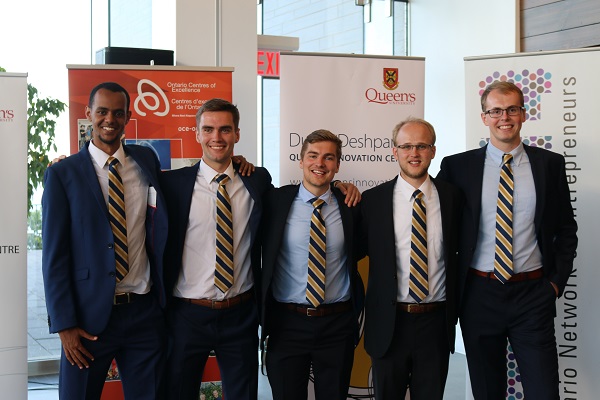QICSI venture taking on the world
September 12, 2017
Share

Hot off their strong performance in the 2017 Dunin-Deshpande Summer Pitch Competition, the guys behind Spectra Plasmonics are taking their show on the road.
Hosted by Singapore Management University, the prestigious Lee Kuan Yew Global Business Plan Competition features 36 finalists vying for 15 prizes including cash and services. This year’s competition theme is “Smart Cities”, and entrants will be judged on four criteria: innovativeness of the business idea; commercial feasibility; the impact of the idea including market, societal impact, and sustainability; and capability to execute.
It was Tyler Whitney (Comm’17, Arts’18) who first heard about the week-long Lee Kuan Yew competition through an exchange opportunity he had in Singapore during his Commerce program. Once Spectra Plasmonics had launched, as part of the Queen’s Innovation Centre Summer Initiative (QICSI), he took the idea of submitting an application back to his teammates. Despite the 550 applications to the competition, including applications from ventures at prestigious American universities, Spectra Plasmonics was one of the lucky few accepted. So, Mr. Whitney, along with teammates Ryan Picard (Sci’17), Malcom Eade (Artsci’18), and Christian Baldwin (Sci'19) packed their bags and headed to Singapore, while team member Yusuf Ahmed (Eng'18) tends to the shop back home.
“Spectra Plasmonics sells an enhancing piece of tech for a chemical detection device which allows for quicker, more accurate detection,” explains Mr. Whitney. “We first heard about the technology through the Office of Partnerships and Innovation when it was pitched to us during QICSI. The technology was invented here at Queen’s in the Chemical Engineering department by Hannah Dies (MSc’21, Meds’21), Dr. Aristides Docoslis, and Dr. Carlos Escobedo, and the product has garnered significant interest from governments and law enforcement agencies. We think this is an excellent fit with the competition theme because our product gives people that live in cities the tools they need to know more about their surroundings and adjust accordingly.”
Once the technology was developed, the Queen's Office of Partnerships and Innovation began working with Dr. Docoslis and the research team to secure patent protection for the technology and seek opportunities to commercialize it. Ramzi Asfour, the office's Assistant Director for Commercial Development for applied science and information technologies, says the technology was a good fit for QICSI businesses because of its short product development cycle and the nearby access to NanoFabrication Kingston's facilities.
“This technology has great potential for changing the way Raman Spectroscopy is currently used,” says Mr. Asfour. “It’s a simple, yet sophisticated technique for enabling cheaper yet highly sensitive chemical sensing in a number of applications where more expensive forms of testing are currently used. We are happy with the progress that Spectra Plasmonics has made to date and are looking forward to continuing to help them achieve long term success.”
To prepare for the competition, the team is tweaking their successful QICSI pitch based on the feedback they received, conducting additional research about the Asian market, and researching past winners. The four members who are making the trip headed over to Singapore a week early to meet with some connections, test their technology in the country, recoup from the jetlag, see a few sights, and meet up with some Queen’s alumni.
“We are excited for the Spectra Plasmonics team and look forward to hearing the final results later this week,” says Greg Bavington, Executive Director of the Dunin-Deshpande Queen’s Innovation Centre which organizes QICSI. “Their business unites students from many different faculties at Queen’s with technology developed here at the university, and it demonstrates the kind of collaborations we enable through our centre. Our students are equipped to start their businesses here and, as we’re seeing with Spectra Plasmonics, by the time they graduate the QICSI program they are leading companies which are garnering interest literally around the world.”
During the week of the competition, the team will be meeting with venture capitalists and entrepreneurs, participating in workshops, and readying for their moment in the sun. The thirty six competitors will be whittled down to six in a semi-final pitch competition. The top six ventures will then vie for a cut of $1 million in prizes.
Stay tuned for an update regarding Spectra Plasmonics’ performance in the competition. For more information on the Lee Kuan Yew Global Business Plan Competition, please visit: www.smu.edu.sg/lky.